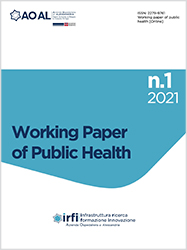The role of the physiotherapist in pediatric obesity prevention: comparing experiences.

All claims expressed in this article are solely those of the authors and do not necessarily represent those of their affiliated organizations, or those of the publisher, the editors and the reviewers. Any product that may be evaluated in this article or claim that may be made by its manufacturer is not guaranteed or endorsed by the publisher.
Autori
Background. Obesity is an emerging issue with serious health consequences. It is preventable in pediatric settings through prevention projects and education about healthy lifestyles. The aim of the study is to analyze the problem and the methods of intervention, through the involvement of physiotherapists throughout Italy, and to explore the interest and sensitivity of Italian physiotherapists to the issue.
Study design. A cross-sectional survey of physiotherapists was conducted using a self-completed online questionnaire, from January to March 2020.
Materials and Methods. Literature analysis searching for national and international prevention strategies. Administration of a cognitive questionnaire to the pediatric GIS group.
Results. Ninety-five point seven percent of the interviewees had never taken part in projects dedicated to pediatric obesity. Three experiences emerged, but only two respondents made themselves available for interview. Ninety-four point four percent of the operators considered the contribution to the health problem useful and 82.2% of them expressed a real interest in the topic.
Conclusions. Physiotherapists should play an active role in planning interventions aimed at promoting and supporting healthy lifestyles from early childhood to early adulthood, starting even earlier during the prenatal and perinatal periods.






